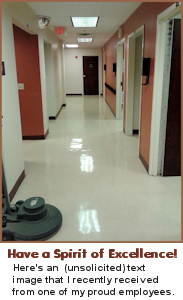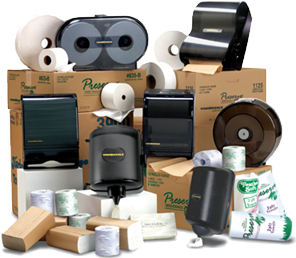Ask Drake
Grand Master Janitor, 30+ years
With the truly, humbling success of CleanlyRun (formerly CleanGuidePro), we’ve received a lot of questions (from companies all over the world) about a variety of topics in the janitorial industry. Today I’d like to share my thoughts on uniforms.
Dear Drake: I’ve had my janitorial business for three years now and have 18 employees. I provide company tee shirts with our name and logo on them. The problem is that it seems like I’m constantly buying tee shirts. When an employee quits, I rarely get the tee shirt back and if I do, it’s so faded and worn that it’s only good for a cleaning rag, not something I’d give to another employee.
What’s your opinion on buying janitorial uniforms versus renting from a uniform company?

Answer: Very good question! I’ve been there and have felt your pain, especially in the wallet. First off, let’s come to the consensus that uniforms of some kind are a must! They enhance your image and project professionalism. Over the years I’ve bought and rented (leased) uniforms at some point with varying degrees of success. I’m defining success in this area as being cost effective, easy to administer and keeping my staff looking sharp.
The pro with buying is that you only buy as needed. The con with buying is that shirts aren’t returned, cheap tee shirts fade and wear out quickly and you have very minimal reuse.
The pro with renting is that they give you procedures and a system to follow. You get forms for ordering – employee assignment sheets that your employees sign – stating how many shirts they received and the cost to the employee (taken from their last pay check) if not returned upon termination of their employment. The con with renting is that you’re locked into a contract (up to 3 years, with payments EVERY month) which can be much more expensive over the course of the contract than buying as needed.
Let me share what has served me well over the years. I use a buying system that utilizes the pros of buying and the pros of renting. A simple system (below) that is cost effective, easy to administer and keeps my staff looking professional!
- Establish your own Employee Uniform Policy and form. It will state the number, size and type of uniform shirt/shirts they receive. Also, your cost of each shirt and stating that they will turn in their uniform shirts a minimum of three days before their last check is cut or the cost will be deducted from there last check. No exceptions. They sign their acceptance of this policy. They keep a copy and you keep a copy in their employee file. Notice, I didn’t mention pants or shoes. I only provide a uniform polo shirt. Employees are required to purchase their pants and shoes at their own cost. We specify jeans or khakis depending on the location and closed toe shoes.
- Buy from a local, established embroidery store that sells tee shirts, polos, button down shirts, caps, custom logos, etc. You support the local economy and usually can purchase as few as two at a time. Don’t buy the plain 100% cotton tee shirts, they fade and wear out quickly. Buy nice, sturdy 100% polyester/synthetic blend polo shirts with company logo. They usually cost about $30 a piece, but these shirts are stain resistant and hold their form and color through hundreds of machine washes (employees are required to wash their own uniform shirts). No one wants to have $90 taken out of their last check over 3 shirts. You’ll get these shirts back 90% of the time. 85% are in good shape and can be reused again and again.
- Create a monthly, uniform ordering form. Have a goal of keeping extra shirts of each size in your warehouse stock. Simply order what you need once a month, once a quarter or as needed.
Remember, in business, have a cost effective system and keep it simple!
![]()


 To acquire new customers, you spend a lot of time, effort and money to market and sell your services. Once you get a new customer, that’s just the beginning; Now you have to keep them!
To acquire new customers, you spend a lot of time, effort and money to market and sell your services. Once you get a new customer, that’s just the beginning; Now you have to keep them!

 When we use the term “Janitorial Supply Sales”, we’re referring to consumable janitorial products that you can sell to your customer. These are NOT the products that you pay for and provide to clean the building with, like glass cleaner, bowl cleaner, furniture polish, etc. We’re talking about the janitorial products your customer “consumes”, like toilet paper, roll towels, multi-fold towels, trash can liners, air fresheners, some chemicals and soaps.
When we use the term “Janitorial Supply Sales”, we’re referring to consumable janitorial products that you can sell to your customer. These are NOT the products that you pay for and provide to clean the building with, like glass cleaner, bowl cleaner, furniture polish, etc. We’re talking about the janitorial products your customer “consumes”, like toilet paper, roll towels, multi-fold towels, trash can liners, air fresheners, some chemicals and soaps.